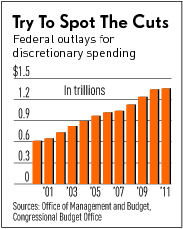Washington's $38 Bil In 'Cuts' Are Bogus
Fiscal Policy: In the bizarro world of Washington budgeting, Congress has managed to boost 2011 spending by $17 billion while claiming to be making a "historic" $38 billion spending cut.
If you want to know why it's so hard to make meaningful cuts in the federal budget, just look at what's happened with the deal Congress passed Thursday that sets spending levels for the rest of the 2011 fiscal year.
When the budget agreement was announced last week, Democrats complained that it cut spending too deeply, and some conservatives said the $38 billion in cuts didn't go far enough. But what everyone in Washington agreed on was that the deal cut federal spending.
Turns out, it didn't. At least not in any normal sense of the term.
According to a Congressional Budget Office report released late Tuesday, the agreement will result in the federal government spending a total of $1.365 trillion on discretionary programs in 2011. That's $17 billion more than the government spent on these programs last year (and $230 billion more than they spent in 2008.)
Worse still, the CBO's most recent "baseline" budget — which assumes that spending simply keeps pace with inflation — put 2011 outlays at $1.361 trillion.
So, in other words, spending would have been $4 billion less had Congress just left the government on autopilot rather than pass this package of "cuts."
And it's worth pointing out that even under this new "austere" budget, the federal deficit is slated to reach an all-time high in 2011.
So where did that $38 billion spending-cut number come from? Basically, it's the result of the incredibly arcane way Washington does its budgets, which lets lawmakers too easily claim fiscal austerity while actual spending marches upward.
In this case, the number is the difference in "non-emergency budget authority" that the Democrats put in place for 2011 when they ran Congress, and the "non-emergency budget authority" in the new plan.
But budget authority is just a license to spend — actual outlays are the only things that matter when it comes to deficits and the debt. (It's a distinction few outside Washington seem to notice or understand.)
In the end, Republicans clearly deserve credit for dramatically changing the terms of the debate in Washington toward one focused on spending cuts and fiscal responsibility rather than stimulus and "investments."
But we should hold the applause until the GOP manages to produce a budget that makes real cuts in spending, not just the phony Washington kind.


